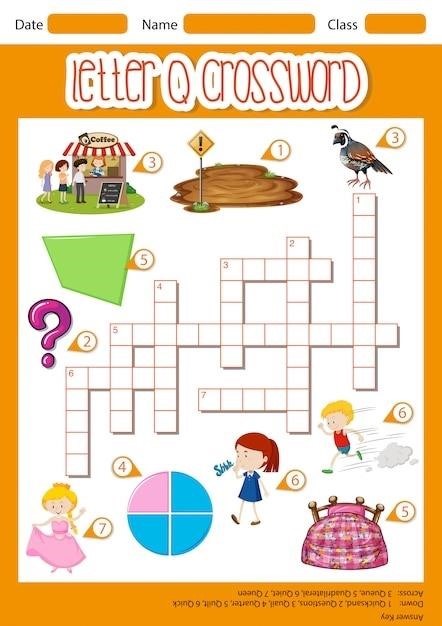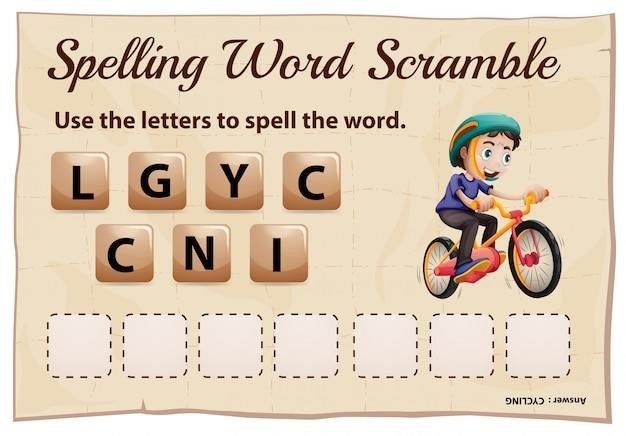

Instruction for Spelling Race Crossword Clue⁚ A Comprehensive Guide
This guide provides a comprehensive approach to solving crossword clues related to “spelling race” instructions․ We’ll explore various clue types, common puzzle sources, and effective strategies for deciphering these challenging clues, ultimately leading you to the correct answer․ Leveraging online solvers and analyzing word length are also key techniques․
Understanding the Clue
Crossword clues related to “instruction for spelling race” often require a nuanced understanding of the puzzle’s context․ The clue itself may be a cryptic phrase or a straightforward description of the activity․ Sometimes, the clue might indirectly refer to the rules or mechanics of a spelling bee or a similar competitive spelling event․ It’s crucial to consider synonyms and related terms․ For instance, “instruction” might be replaced with “rule,” “guideline,” or “directions․” Similarly, “spelling race” could be described as a “spelling bee,” “spelling contest,” or even a “word game․” The length of the answer is also a vital clue; knowing the number of letters helps narrow down possibilities significantly․ Consider the surrounding clues in the crossword; they may provide hints or related words that illuminate the meaning of the target clue․
Analyzing the wording carefully is paramount․ Is the clue looking for a single word, a phrase, or even an acronym? Does the clue imply a specific type of spelling competition, like one with a time limit or a progressive elimination format? Paying attention to these subtle details significantly increases the chances of finding the correct answer․ Remember that cryptic clues may use wordplay or misdirection, making careful analysis crucial for success․
Types of Spelling Race Clues
Crossword clues related to “instruction for spelling race” can manifest in several forms, demanding diverse approaches to solution․ Straightforward clues might directly state, “Rules for a spelling contest,” or “Instructions for a spelling bee․” These are relatively easy to decipher․ However, cryptic clues introduce complexity․ They might use wordplay, such as a pun or a riddle, requiring solvers to think laterally․ For example, a clue might be “Rapid word test,” implying the speed aspect of a spelling race․ Another type involves indirect references․ The clue could describe an element of a spelling race without explicitly mentioning it․ For instance, “Timed word challenge” hints at the time constraint often present in such events․ The clue might also focus on a specific aspect, like the scoring system, using phrases such as “Points awarded for correct spelling” or “Penalty for misspelling․”
Furthermore, some clues might incorporate misdirection, leading solvers astray with seemingly relevant but ultimately incorrect terms․ Therefore, a thorough understanding of common spelling competition terminology is crucial․ The diversity of these clue types necessitates flexible problem-solving strategies, combining deductive reasoning with a broad vocabulary and knowledge of word games․
Common Crossword Puzzle Sources
Encountering a “spelling race” instruction clue necessitates familiarity with common crossword puzzle sources․ Major newspapers like the New York Times, the Los Angeles Times, and the Telegraph often feature daily crossword puzzles, presenting a diverse range of clue styles and difficulty levels․ These publications cater to a broad audience, resulting in clues that range from straightforward to exceptionally challenging; Syndicated puzzles, distributed to multiple publications, also contribute to the pool of potential sources for this type of clue․ These often maintain a consistent format and difficulty, making them predictable once you become familiar with their style․ Online platforms, such as those found on various news websites or dedicated crossword puzzle apps and websites, offer a vast array of puzzles, including themed crosswords which might incorporate a “spelling race” instruction clue with greater frequency․
Additionally, puzzle books, both physical and digital, provide another avenue for encountering these types of clues․ These books frequently group puzzles by difficulty, allowing solvers to select challenges tailored to their skill level․ The diversity of sources underscores the importance of exploring various puzzle types to increase your exposure to different clue styles and improve your overall crossword-solving abilities․
Strategies for Solving Spelling Race Clues
Tackling crossword clues related to “spelling race” instructions requires a multifaceted approach․ Begin by carefully examining the clue’s wording for any hints regarding the answer’s length or potential synonyms․ Look for keywords that might indicate the type of spelling activity involved, such as “scramble,” “anagram,” or “jumble․” Consider the surrounding clues; intersecting words can often provide crucial letters or patterns to aid in solving the “spelling race” clue; If the clue mentions a specific number of letters, this is a key constraint to focus on when considering potential answers․ Don’t hesitate to use online crossword solvers as a resource, but treat them as a tool to verify answers, not a substitute for critical thinking․
Employ a process of elimination; if you suspect an answer, check if it fits the available spaces and intersecting letters․ Consider synonyms and related words; the clue might be using figurative language or a less direct approach․ If stuck, try working on other parts of the crossword to gather more letters and potential clues․ Finally, remember that perseverance and a systematic approach are essential when solving challenging crossword clues, especially those involving “spelling race” instructions․ The satisfaction of unlocking the answer through careful analysis is a rewarding aspect of the puzzle-solving experience․
Utilizing Online Crossword Solvers
Online crossword solvers can be invaluable tools when tackling particularly challenging clues, including those related to “spelling race” instructions․ These digital aids offer a range of functionalities beyond simple word searches․ Many solvers allow you to input partial answers, known letters, and even the number of letters in the solution․ This targeted approach helps narrow down the possibilities considerably, saving you time and effort․ However, it’s crucial to use online solvers strategically, not as a crutch․ They should be employed to verify your own deductions and explore possibilities, not to simply provide immediate answers․
Effective use of online solvers involves combining their capabilities with your own problem-solving skills․ For example, you might use a solver to generate a list of words with a specific number of letters that fit the available spaces in your crossword․ Then, you can check if any of those words logically align with the clue’s description of a “spelling race” instruction․ Remember that relying too heavily on online solvers can hinder your ability to develop your own crossword-solving skills․ The goal is to use these tools to enhance your problem-solving, not replace it․
Analyzing Clue Word Length
The length of the answer is a crucial piece of information when solving any crossword clue, including those pertaining to “spelling race” instructions․ Before even beginning to brainstorm possible answers, carefully note the number of spaces allocated to the answer in the crossword grid․ This simple step immediately limits the possibilities․ For instance, if the grid indicates a seven-letter answer, you can instantly eliminate any potential solutions with fewer or more letters․ This process of elimination is fundamental to efficient crossword solving․
Furthermore, understanding the word length can help guide your search strategy․ If the clue suggests a specific type of instruction, knowing the word length can help you focus your search on words fitting both the length requirement and the semantic context․ You might find that a certain number of letters lends itself to a specific type of instruction related to spelling races․ For example, a shorter word might suggest a concise command, while a longer word might indicate a more detailed set of instructions․ Always start by analyzing the word length; it’s the foundation of a successful approach․
Considering Related Clues
Crossword puzzles are rarely solved by tackling each clue in isolation․ A crucial strategy involves examining related clues, both horizontally and vertically, to uncover potential connections and letter combinations․ If you’re stuck on an “instruction for spelling race” clue, look closely at the intersecting words․ The letters already filled in those intersecting words may reveal crucial letters within the solution to your target clue, significantly narrowing down your options and increasing your chances of finding the correct answer․ This interconnectedness is a hallmark of crossword design; clues often work in tandem․
Consider the overall theme or topic of the crossword․ If the puzzle focuses on a particular subject, the clue about spelling race instructions might align with that theme; For example, a crossword themed around education might contain clues related to classroom activities, such as spelling competitions․ Recognizing this thematic coherence can provide valuable context and guide you toward the correct answer․ Don’t just focus on the individual clue; use the entire puzzle’s context to your advantage․ This holistic approach is key to unlocking even the most challenging crossword entries․

Exploring Synonym Usage
Crossword puzzle clues frequently employ synonyms to obfuscate the answer․ When tackling a clue like “instruction for spelling race,” consider the various ways to express the core concept․ Instead of directly referencing “instructions,” the clue might use synonyms like “directions,” “guidelines,” “rules,” or “dictates․” Similarly, “spelling race” could be alluded to with synonyms such as “spelling bee,” “spelling contest,” or even more subtly, “word game” or “letter challenge․” Exploring these nuanced word choices is crucial․
To effectively utilize synonym exploration, consult a thesaurus․ This tool provides a comprehensive list of synonyms for a given word, allowing you to expand your search beyond the most obvious terms․ Consider the context of the clue․ If the crossword has a specific theme or tone (e․g․, formal, informal, playful), the choice of synonym will often reflect that․ A formal crossword might use “guidelines,” while a more lighthearted one might opt for “rules․” By carefully considering synonyms and their connotations, you can significantly improve your chances of solving even the most cleverly worded crossword clues․
Leveraging Crossword Databases
Online crossword databases are invaluable resources for solving challenging clues․ These databases contain extensive collections of past crossword puzzles and their solutions, allowing you to search for clues similar to “instruction for spelling race․” By inputting the clue or parts of it, you can access a list of previously used answers, potentially revealing the solution․ Many databases also offer search filters based on word length, allowing you to narrow down the possibilities․ This is especially helpful when you know the number of letters the answer should contain․
Furthermore, these databases often provide related clues, which can offer additional context and hints․ If “instruction for spelling race” yields no direct results, exploring similar clues, such as those related to spelling competitions or word games, might reveal related answers that could be used․ Remember to check multiple databases, as each may contain unique entries․ By combining the power of online resources with your own problem-solving skills, you can effectively overcome even the most complex crossword challenges․ Crossword databases are a crucial part of any serious crossword solver’s arsenal․
Verifying Answers with Multiple Sources
Once you’ve identified a potential answer for the “instruction for spelling race” clue, it’s crucial to verify its accuracy using multiple sources․ Relying solely on a single online solver or dictionary can be risky, as errors can occur․ Cross-referencing your answer with several reputable sources significantly increases the chances of finding the correct solution․ Consider consulting different online crossword solvers, each employing unique algorithms and databases․
In addition to online solvers, you can also use physical dictionaries and thesauruses to confirm the answer’s validity and meaning within the context of the clue․ Checking if the answer fits grammatically and semantically within the surrounding crossword clues is also important․ A well-verified answer should seamlessly integrate into the overall puzzle, not just fit the length and letter pattern․ This multi-faceted approach minimizes the risk of errors and ensures that your solution is accurate and reliable․ Remember, thorough verification is key to mastering crossword puzzles․